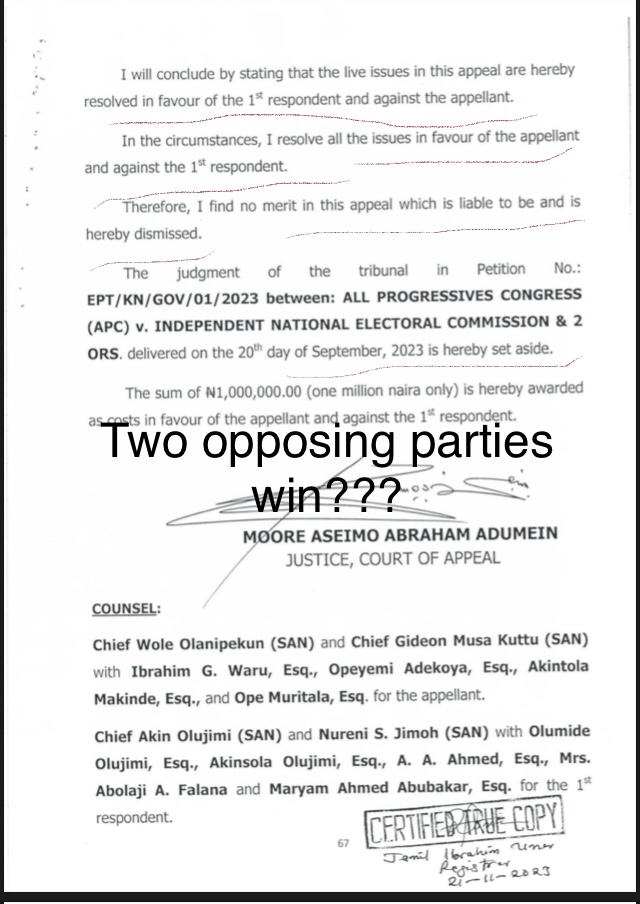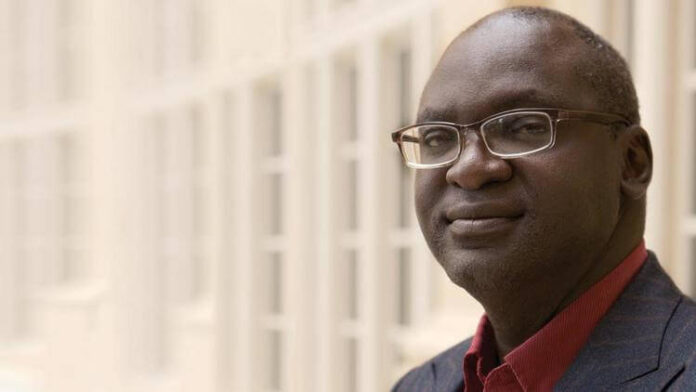Judicial anarchy and the infamy in Kano
By Emmanuel Ogebe
Apart from its ineffectiveness and signal failure to stop state capture by hardened criminal elements, the Nigerian judiciary is now imploding before our very eyes under the weight of incompetence, overwork regardless of corrupt motive.
Non-lawyers can now see in stark terms the logical inconsistencies, legal absurdities and rational incongruities lawyers have been seeing and lamenting about.
According to media reports, “Confusion as A’Court’s certified judgment upholds Gov. Abba Yusuf’s election
Contrary to public declaration, fresh revelation has indicated that the Court of Appeal, sitting on Kano governorship election, set aside the judgment of the Kano petition tribunal.
In the revelation as contained in the certified true copy of the Appeal Court judgment released on Tuesday, the appellate court upheld the victory of Abba Kabiru Yusuf of the New Nigeria Peoples Party (NNPP) as duly elected Governor of Kano.
The three-member panel of the Appeal Court, on Friday, November 17, 2023 had dismissed the appeal filed by Governor Yusuf on the basis of his membership status.
The appellate court subsequently affirmed Nasiru Yusuf Gawuna of the All Progressives Congress (APC) as winner of March 25, 2023 Governorship poll in Kano.
In one instance, the appellate court declared: “I will conclude by stating that the live issues in this appeal are hereby resolved in favour of the 1st respondent (APC) and against the appellant (Governor Abba Yusuf)”, but went further to contradict itself in another sentence.
The court said: “In the circumstances, I resolve all the issues in favour of the appellant (NNPP) and against the 1st respondent (APC).”

The court further contradicted itself, declaring “Therefore, I find no merit in this appeal which is liable to be and is hereby dismissed.”
But in the final line of the judgment, the court set aside the judgment of the tribunal, which sacked the governor.
“The judgment of the tribunal In Petition No.: EPT/KN/GOV/01/2023 between: ALL PROGRESSIVES CONGRESS (APC) v. INDEPENDENT NATIONAL ELECTORAL COMMISSION & 2 ORS. delivered on the 20th day of September, 2023 is hereby set aside,” the CTC of the judgement read.”
I received a copy of the judgment today in Washington from a retired Justice in Nigeria and I thought his Lordship must have been mistaken. Upon reading the relevant part, it was clear that the confusion was court-ordered.
In Nigeria, it is no longer INEC result declaration that is inconsistent with IREV result transmission. Now Court judgment declaration is inconsistent with Court written judgment!
It is now left for the Supreme Court to say that the written judgment is not a collation system and is only a guideline that is not mandatory so only the declared judgment is lawful. The question therefore is – what if the oral judgment was not recorded for reference?
This is why we must join the civilized world and have court recordings of proceedings. Even pre-civilization societies were scripta. Egyptian hieroglyphics right here in Africa and other ancient parchments still tell tales of past civilizations and societies. How can Nigeria continue in an oral tradition that is flawed?
Secondly, court judgments MUST be circulated on the spot. A situation where parties wait days for a written judgment copy to be available breeds room for mischief, confusion and chaos.
But the concern about the Kano Appeal Court judgment is not just that the judiciary has become like INEC where the numbers no longer add up. Before Kano’s verdict, Court of Appeal judgments of different divisions contradicted themselves. Then court judgments on Plateau petitions before the same panel contradicted themselves. Now in the Kano case, a court judgment in the same case and on the same page contradicted itself!
The judiciary is now unmasked and lady justice is now dancing naked in the market square to the shame of us all.
The Kano judgment has added another unnecessary nail in the coffin of the Nigerian judiciary which died last month when a serial bad actor defeated the Nigerian legal system, constitution and democracy after a quarter century of legal wrangling. It is therefore no surprise that the Kano judgment looks like Bola Tinubu’s Chicago certificate. Both will never regain credibility again under these circumstances.
The Guardian also reports:
• Judiciary constitutes 98 panels to hear 1,209 election petitions
• 10 (out of 21) apex court justices saddled with 6,884 cases
• 346 judges drawn from various courts for electoral duties
• Fastest case from High Court to Supreme Court may take average of 30 years –
The Nigerian judiciary is not sustainable even if corruption is eliminated given the capacity constraints in personnel and technology as oft noted. The time for urgent reform is yesterday lest the judiciary lead Nigeria to anarchy as it is itself embroiled in.
Kano is a volatile and violent state and should be the last place where a judicial powder keg should be ignited.
I call on the NJC to investigate the origins of this bizarre lead judgment and more especially why the two concurring justices claimed to have read the draft and agreed with the obvious errors contained therein which for the first time in history renders Kano State governorless.
Until this is exhaustively addressed, the Nigerian public can only see the Nigerian judiciary as another example of state failure and state capture.
Even if technology and manpower deficits are rectified, the credibility crisis of the judiciary cannot be cured by mere funding.
















